Internet of Things: Challenges and Strategies for Smart Cities
VerifiedAdded on 2023/06/10
|7
|1755
|275
Essay
AI Summary
This essay delves into the challenges and issues associated with implementing the Internet of Things (IoT) in urban smart cities. It begins by highlighting the increasing trend of urbanization and the adoption of smart city technologies. The essay reviews 11 scholarly articles to identify key challenges, including big data management, security, privacy, and the failure of nodes due to malicious attacks. It explores the professional, legal, ethical, social, and environmental issues related to IoT implementation. The analysis focuses on the need for new algorithms to process mass data, utilize big data to improve service quality, and enhance security measures to protect user information. The conclusion emphasizes the importance of addressing privacy and security concerns, particularly in data storage, and suggests the need for robust security protocols. The essay provides a comprehensive overview of the challenges and mitigation techniques discussed in various research papers related to building smart cities.
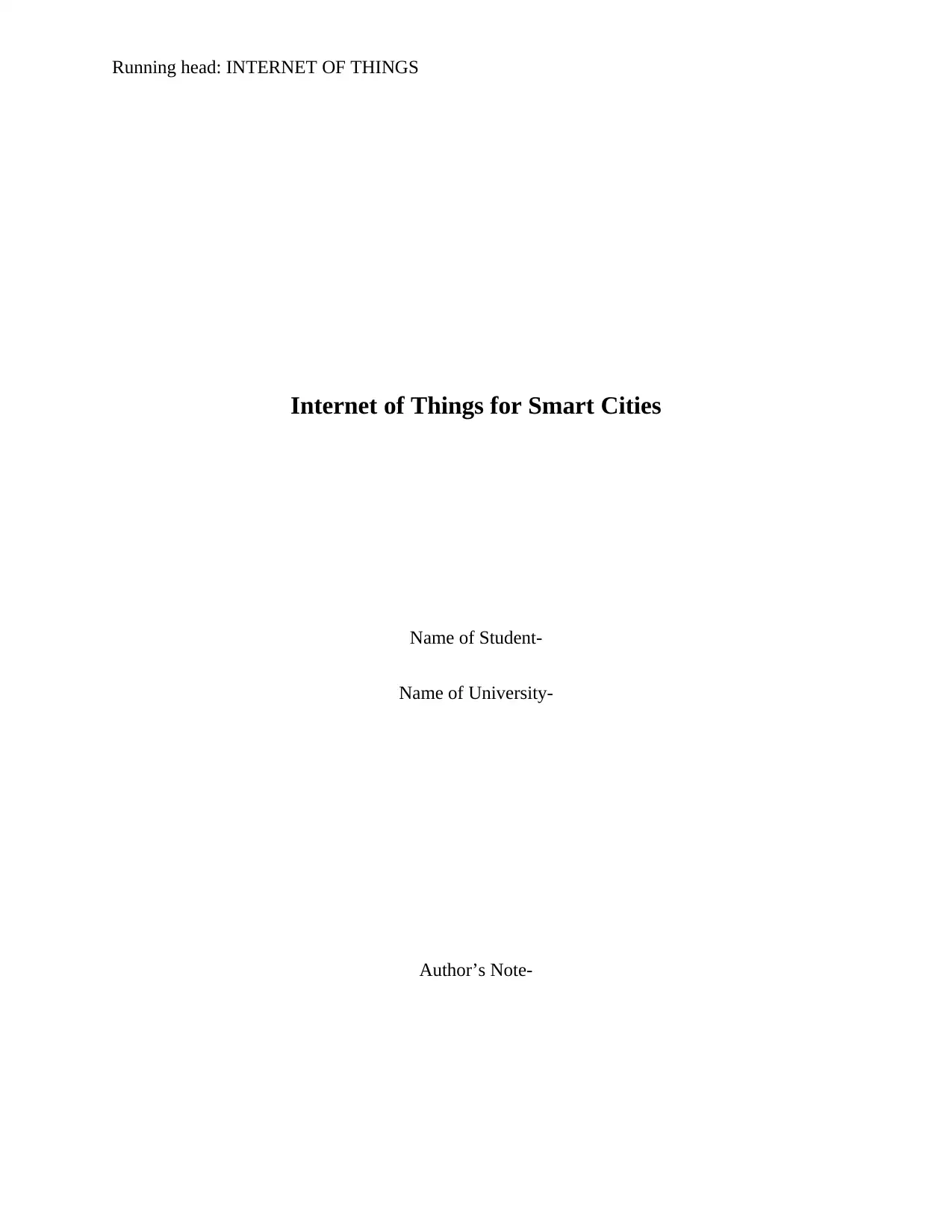
Running head: INTERNET OF THINGS
Internet of Things for Smart Cities
Name of Student-
Name of University-
Author’s Note-
Internet of Things for Smart Cities
Name of Student-
Name of University-
Author’s Note-
Paraphrase This Document
Need a fresh take? Get an instant paraphrase of this document with our AI Paraphraser
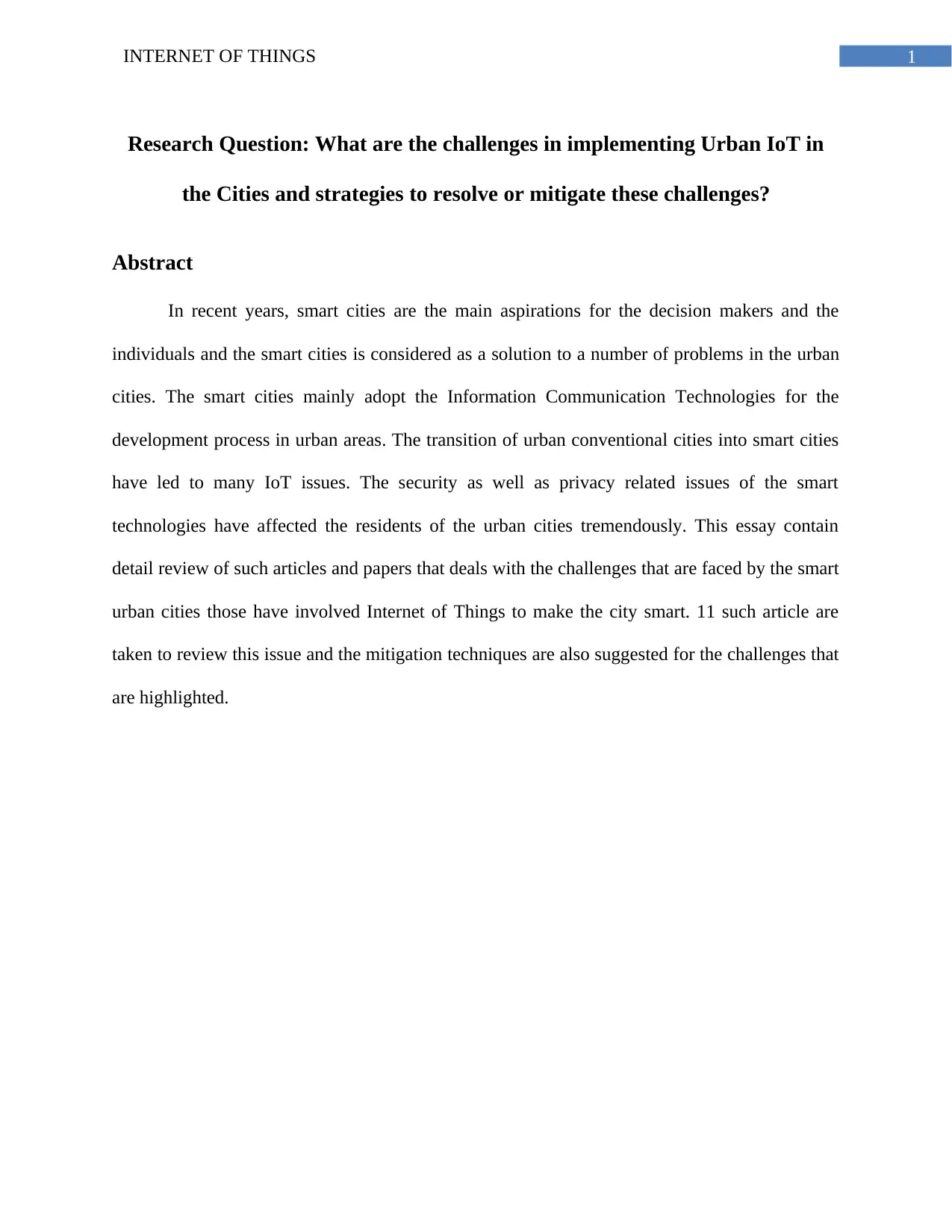
1INTERNET OF THINGS
Research Question: What are the challenges in implementing Urban IoT in
the Cities and strategies to resolve or mitigate these challenges?
Abstract
In recent years, smart cities are the main aspirations for the decision makers and the
individuals and the smart cities is considered as a solution to a number of problems in the urban
cities. The smart cities mainly adopt the Information Communication Technologies for the
development process in urban areas. The transition of urban conventional cities into smart cities
have led to many IoT issues. The security as well as privacy related issues of the smart
technologies have affected the residents of the urban cities tremendously. This essay contain
detail review of such articles and papers that deals with the challenges that are faced by the smart
urban cities those have involved Internet of Things to make the city smart. 11 such article are
taken to review this issue and the mitigation techniques are also suggested for the challenges that
are highlighted.
Research Question: What are the challenges in implementing Urban IoT in
the Cities and strategies to resolve or mitigate these challenges?
Abstract
In recent years, smart cities are the main aspirations for the decision makers and the
individuals and the smart cities is considered as a solution to a number of problems in the urban
cities. The smart cities mainly adopt the Information Communication Technologies for the
development process in urban areas. The transition of urban conventional cities into smart cities
have led to many IoT issues. The security as well as privacy related issues of the smart
technologies have affected the residents of the urban cities tremendously. This essay contain
detail review of such articles and papers that deals with the challenges that are faced by the smart
urban cities those have involved Internet of Things to make the city smart. 11 such article are
taken to review this issue and the mitigation techniques are also suggested for the challenges that
are highlighted.
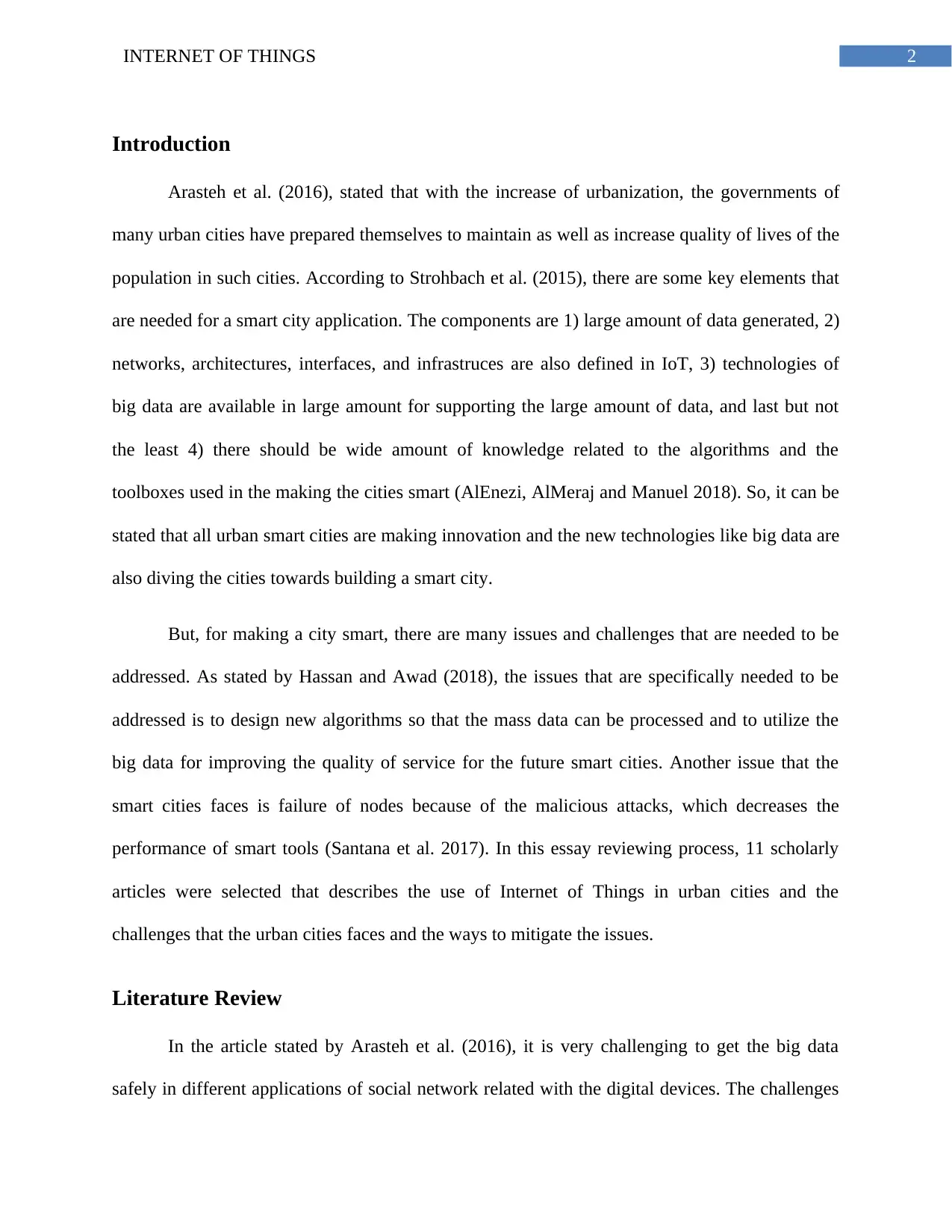
2INTERNET OF THINGS
Introduction
Arasteh et al. (2016), stated that with the increase of urbanization, the governments of
many urban cities have prepared themselves to maintain as well as increase quality of lives of the
population in such cities. According to Strohbach et al. (2015), there are some key elements that
are needed for a smart city application. The components are 1) large amount of data generated, 2)
networks, architectures, interfaces, and infrastruces are also defined in IoT, 3) technologies of
big data are available in large amount for supporting the large amount of data, and last but not
the least 4) there should be wide amount of knowledge related to the algorithms and the
toolboxes used in the making the cities smart (AlEnezi, AlMeraj and Manuel 2018). So, it can be
stated that all urban smart cities are making innovation and the new technologies like big data are
also diving the cities towards building a smart city.
But, for making a city smart, there are many issues and challenges that are needed to be
addressed. As stated by Hassan and Awad (2018), the issues that are specifically needed to be
addressed is to design new algorithms so that the mass data can be processed and to utilize the
big data for improving the quality of service for the future smart cities. Another issue that the
smart cities faces is failure of nodes because of the malicious attacks, which decreases the
performance of smart tools (Santana et al. 2017). In this essay reviewing process, 11 scholarly
articles were selected that describes the use of Internet of Things in urban cities and the
challenges that the urban cities faces and the ways to mitigate the issues.
Literature Review
In the article stated by Arasteh et al. (2016), it is very challenging to get the big data
safely in different applications of social network related with the digital devices. The challenges
Introduction
Arasteh et al. (2016), stated that with the increase of urbanization, the governments of
many urban cities have prepared themselves to maintain as well as increase quality of lives of the
population in such cities. According to Strohbach et al. (2015), there are some key elements that
are needed for a smart city application. The components are 1) large amount of data generated, 2)
networks, architectures, interfaces, and infrastruces are also defined in IoT, 3) technologies of
big data are available in large amount for supporting the large amount of data, and last but not
the least 4) there should be wide amount of knowledge related to the algorithms and the
toolboxes used in the making the cities smart (AlEnezi, AlMeraj and Manuel 2018). So, it can be
stated that all urban smart cities are making innovation and the new technologies like big data are
also diving the cities towards building a smart city.
But, for making a city smart, there are many issues and challenges that are needed to be
addressed. As stated by Hassan and Awad (2018), the issues that are specifically needed to be
addressed is to design new algorithms so that the mass data can be processed and to utilize the
big data for improving the quality of service for the future smart cities. Another issue that the
smart cities faces is failure of nodes because of the malicious attacks, which decreases the
performance of smart tools (Santana et al. 2017). In this essay reviewing process, 11 scholarly
articles were selected that describes the use of Internet of Things in urban cities and the
challenges that the urban cities faces and the ways to mitigate the issues.
Literature Review
In the article stated by Arasteh et al. (2016), it is very challenging to get the big data
safely in different applications of social network related with the digital devices. The challenges
⊘ This is a preview!⊘
Do you want full access?
Subscribe today to unlock all pages.

Trusted by 1+ million students worldwide
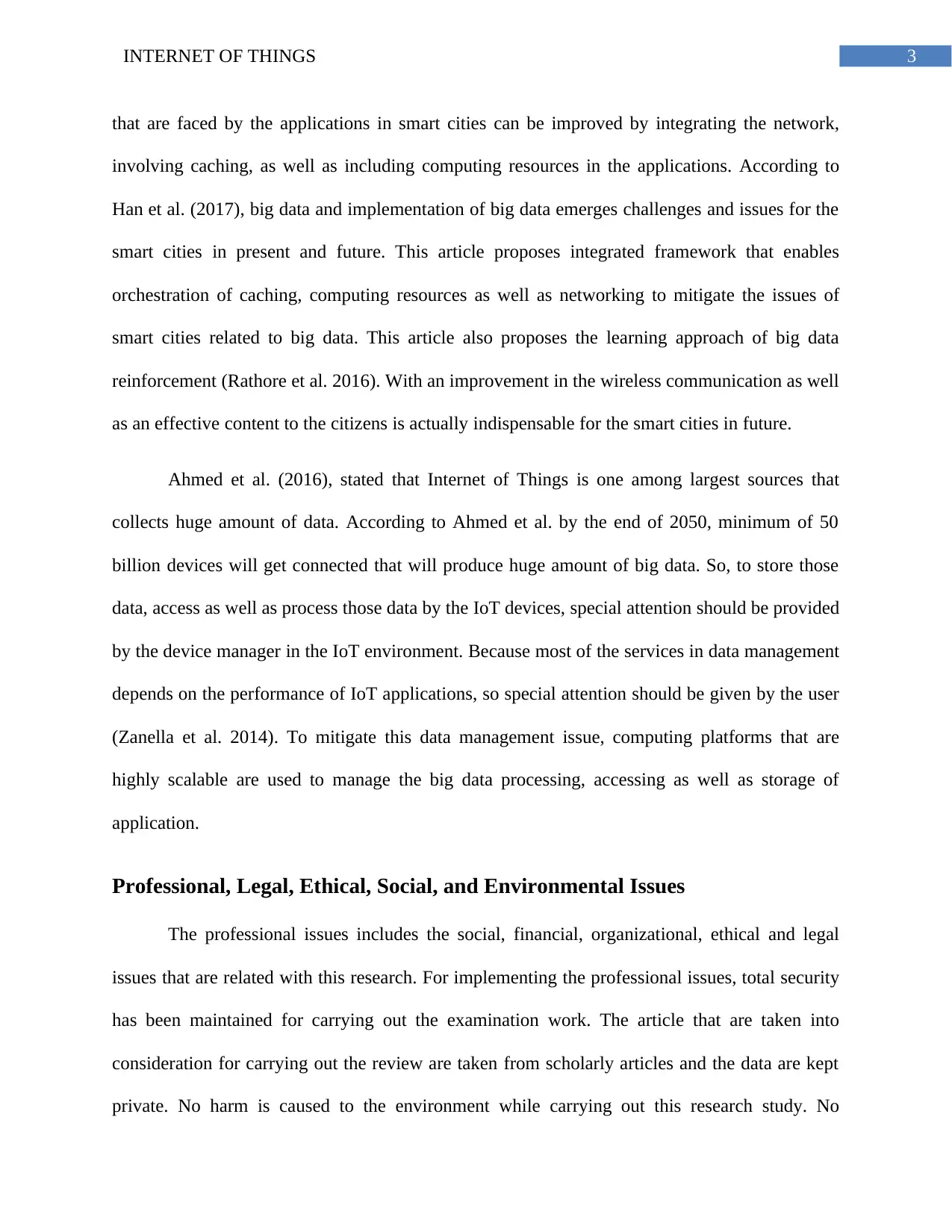
3INTERNET OF THINGS
that are faced by the applications in smart cities can be improved by integrating the network,
involving caching, as well as including computing resources in the applications. According to
Han et al. (2017), big data and implementation of big data emerges challenges and issues for the
smart cities in present and future. This article proposes integrated framework that enables
orchestration of caching, computing resources as well as networking to mitigate the issues of
smart cities related to big data. This article also proposes the learning approach of big data
reinforcement (Rathore et al. 2016). With an improvement in the wireless communication as well
as an effective content to the citizens is actually indispensable for the smart cities in future.
Ahmed et al. (2016), stated that Internet of Things is one among largest sources that
collects huge amount of data. According to Ahmed et al. by the end of 2050, minimum of 50
billion devices will get connected that will produce huge amount of big data. So, to store those
data, access as well as process those data by the IoT devices, special attention should be provided
by the device manager in the IoT environment. Because most of the services in data management
depends on the performance of IoT applications, so special attention should be given by the user
(Zanella et al. 2014). To mitigate this data management issue, computing platforms that are
highly scalable are used to manage the big data processing, accessing as well as storage of
application.
Professional, Legal, Ethical, Social, and Environmental Issues
The professional issues includes the social, financial, organizational, ethical and legal
issues that are related with this research. For implementing the professional issues, total security
has been maintained for carrying out the examination work. The article that are taken into
consideration for carrying out the review are taken from scholarly articles and the data are kept
private. No harm is caused to the environment while carrying out this research study. No
that are faced by the applications in smart cities can be improved by integrating the network,
involving caching, as well as including computing resources in the applications. According to
Han et al. (2017), big data and implementation of big data emerges challenges and issues for the
smart cities in present and future. This article proposes integrated framework that enables
orchestration of caching, computing resources as well as networking to mitigate the issues of
smart cities related to big data. This article also proposes the learning approach of big data
reinforcement (Rathore et al. 2016). With an improvement in the wireless communication as well
as an effective content to the citizens is actually indispensable for the smart cities in future.
Ahmed et al. (2016), stated that Internet of Things is one among largest sources that
collects huge amount of data. According to Ahmed et al. by the end of 2050, minimum of 50
billion devices will get connected that will produce huge amount of big data. So, to store those
data, access as well as process those data by the IoT devices, special attention should be provided
by the device manager in the IoT environment. Because most of the services in data management
depends on the performance of IoT applications, so special attention should be given by the user
(Zanella et al. 2014). To mitigate this data management issue, computing platforms that are
highly scalable are used to manage the big data processing, accessing as well as storage of
application.
Professional, Legal, Ethical, Social, and Environmental Issues
The professional issues includes the social, financial, organizational, ethical and legal
issues that are related with this research. For implementing the professional issues, total security
has been maintained for carrying out the examination work. The article that are taken into
consideration for carrying out the review are taken from scholarly articles and the data are kept
private. No harm is caused to the environment while carrying out this research study. No
Paraphrase This Document
Need a fresh take? Get an instant paraphrase of this document with our AI Paraphraser
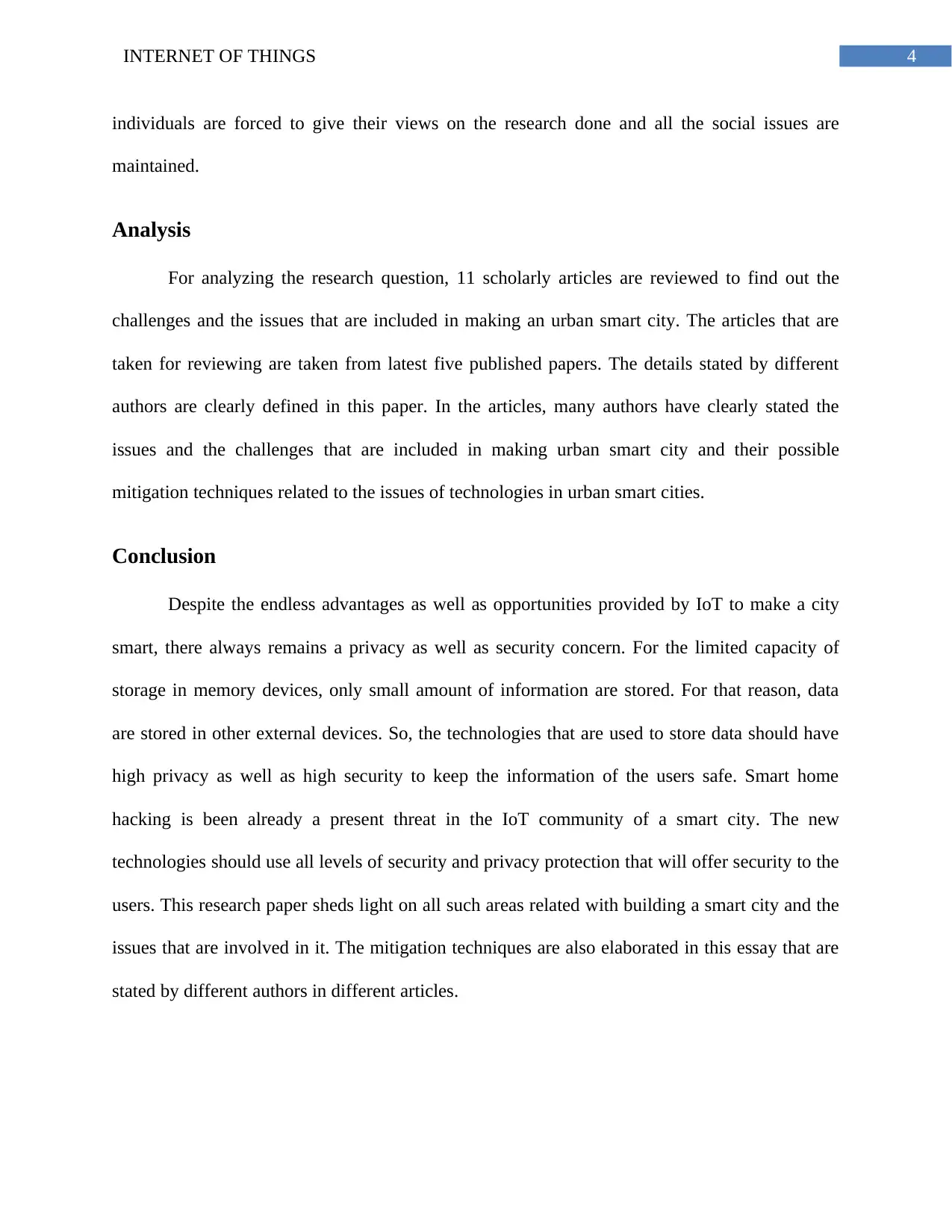
4INTERNET OF THINGS
individuals are forced to give their views on the research done and all the social issues are
maintained.
Analysis
For analyzing the research question, 11 scholarly articles are reviewed to find out the
challenges and the issues that are included in making an urban smart city. The articles that are
taken for reviewing are taken from latest five published papers. The details stated by different
authors are clearly defined in this paper. In the articles, many authors have clearly stated the
issues and the challenges that are included in making urban smart city and their possible
mitigation techniques related to the issues of technologies in urban smart cities.
Conclusion
Despite the endless advantages as well as opportunities provided by IoT to make a city
smart, there always remains a privacy as well as security concern. For the limited capacity of
storage in memory devices, only small amount of information are stored. For that reason, data
are stored in other external devices. So, the technologies that are used to store data should have
high privacy as well as high security to keep the information of the users safe. Smart home
hacking is been already a present threat in the IoT community of a smart city. The new
technologies should use all levels of security and privacy protection that will offer security to the
users. This research paper sheds light on all such areas related with building a smart city and the
issues that are involved in it. The mitigation techniques are also elaborated in this essay that are
stated by different authors in different articles.
individuals are forced to give their views on the research done and all the social issues are
maintained.
Analysis
For analyzing the research question, 11 scholarly articles are reviewed to find out the
challenges and the issues that are included in making an urban smart city. The articles that are
taken for reviewing are taken from latest five published papers. The details stated by different
authors are clearly defined in this paper. In the articles, many authors have clearly stated the
issues and the challenges that are included in making urban smart city and their possible
mitigation techniques related to the issues of technologies in urban smart cities.
Conclusion
Despite the endless advantages as well as opportunities provided by IoT to make a city
smart, there always remains a privacy as well as security concern. For the limited capacity of
storage in memory devices, only small amount of information are stored. For that reason, data
are stored in other external devices. So, the technologies that are used to store data should have
high privacy as well as high security to keep the information of the users safe. Smart home
hacking is been already a present threat in the IoT community of a smart city. The new
technologies should use all levels of security and privacy protection that will offer security to the
users. This research paper sheds light on all such areas related with building a smart city and the
issues that are involved in it. The mitigation techniques are also elaborated in this essay that are
stated by different authors in different articles.
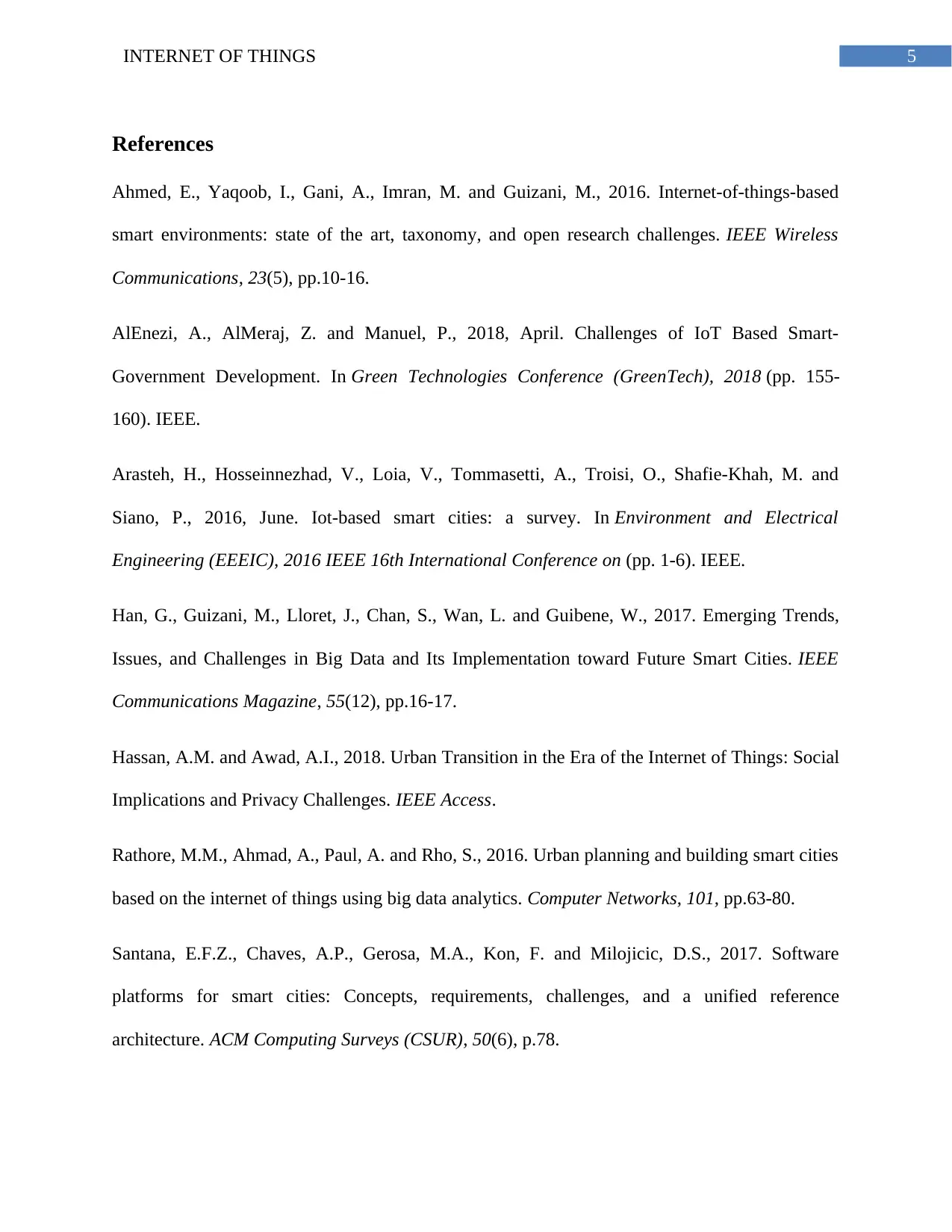
5INTERNET OF THINGS
References
Ahmed, E., Yaqoob, I., Gani, A., Imran, M. and Guizani, M., 2016. Internet-of-things-based
smart environments: state of the art, taxonomy, and open research challenges. IEEE Wireless
Communications, 23(5), pp.10-16.
AlEnezi, A., AlMeraj, Z. and Manuel, P., 2018, April. Challenges of IoT Based Smart-
Government Development. In Green Technologies Conference (GreenTech), 2018 (pp. 155-
160). IEEE.
Arasteh, H., Hosseinnezhad, V., Loia, V., Tommasetti, A., Troisi, O., Shafie-Khah, M. and
Siano, P., 2016, June. Iot-based smart cities: a survey. In Environment and Electrical
Engineering (EEEIC), 2016 IEEE 16th International Conference on (pp. 1-6). IEEE.
Han, G., Guizani, M., Lloret, J., Chan, S., Wan, L. and Guibene, W., 2017. Emerging Trends,
Issues, and Challenges in Big Data and Its Implementation toward Future Smart Cities. IEEE
Communications Magazine, 55(12), pp.16-17.
Hassan, A.M. and Awad, A.I., 2018. Urban Transition in the Era of the Internet of Things: Social
Implications and Privacy Challenges. IEEE Access.
Rathore, M.M., Ahmad, A., Paul, A. and Rho, S., 2016. Urban planning and building smart cities
based on the internet of things using big data analytics. Computer Networks, 101, pp.63-80.
Santana, E.F.Z., Chaves, A.P., Gerosa, M.A., Kon, F. and Milojicic, D.S., 2017. Software
platforms for smart cities: Concepts, requirements, challenges, and a unified reference
architecture. ACM Computing Surveys (CSUR), 50(6), p.78.
References
Ahmed, E., Yaqoob, I., Gani, A., Imran, M. and Guizani, M., 2016. Internet-of-things-based
smart environments: state of the art, taxonomy, and open research challenges. IEEE Wireless
Communications, 23(5), pp.10-16.
AlEnezi, A., AlMeraj, Z. and Manuel, P., 2018, April. Challenges of IoT Based Smart-
Government Development. In Green Technologies Conference (GreenTech), 2018 (pp. 155-
160). IEEE.
Arasteh, H., Hosseinnezhad, V., Loia, V., Tommasetti, A., Troisi, O., Shafie-Khah, M. and
Siano, P., 2016, June. Iot-based smart cities: a survey. In Environment and Electrical
Engineering (EEEIC), 2016 IEEE 16th International Conference on (pp. 1-6). IEEE.
Han, G., Guizani, M., Lloret, J., Chan, S., Wan, L. and Guibene, W., 2017. Emerging Trends,
Issues, and Challenges in Big Data and Its Implementation toward Future Smart Cities. IEEE
Communications Magazine, 55(12), pp.16-17.
Hassan, A.M. and Awad, A.I., 2018. Urban Transition in the Era of the Internet of Things: Social
Implications and Privacy Challenges. IEEE Access.
Rathore, M.M., Ahmad, A., Paul, A. and Rho, S., 2016. Urban planning and building smart cities
based on the internet of things using big data analytics. Computer Networks, 101, pp.63-80.
Santana, E.F.Z., Chaves, A.P., Gerosa, M.A., Kon, F. and Milojicic, D.S., 2017. Software
platforms for smart cities: Concepts, requirements, challenges, and a unified reference
architecture. ACM Computing Surveys (CSUR), 50(6), p.78.
⊘ This is a preview!⊘
Do you want full access?
Subscribe today to unlock all pages.

Trusted by 1+ million students worldwide
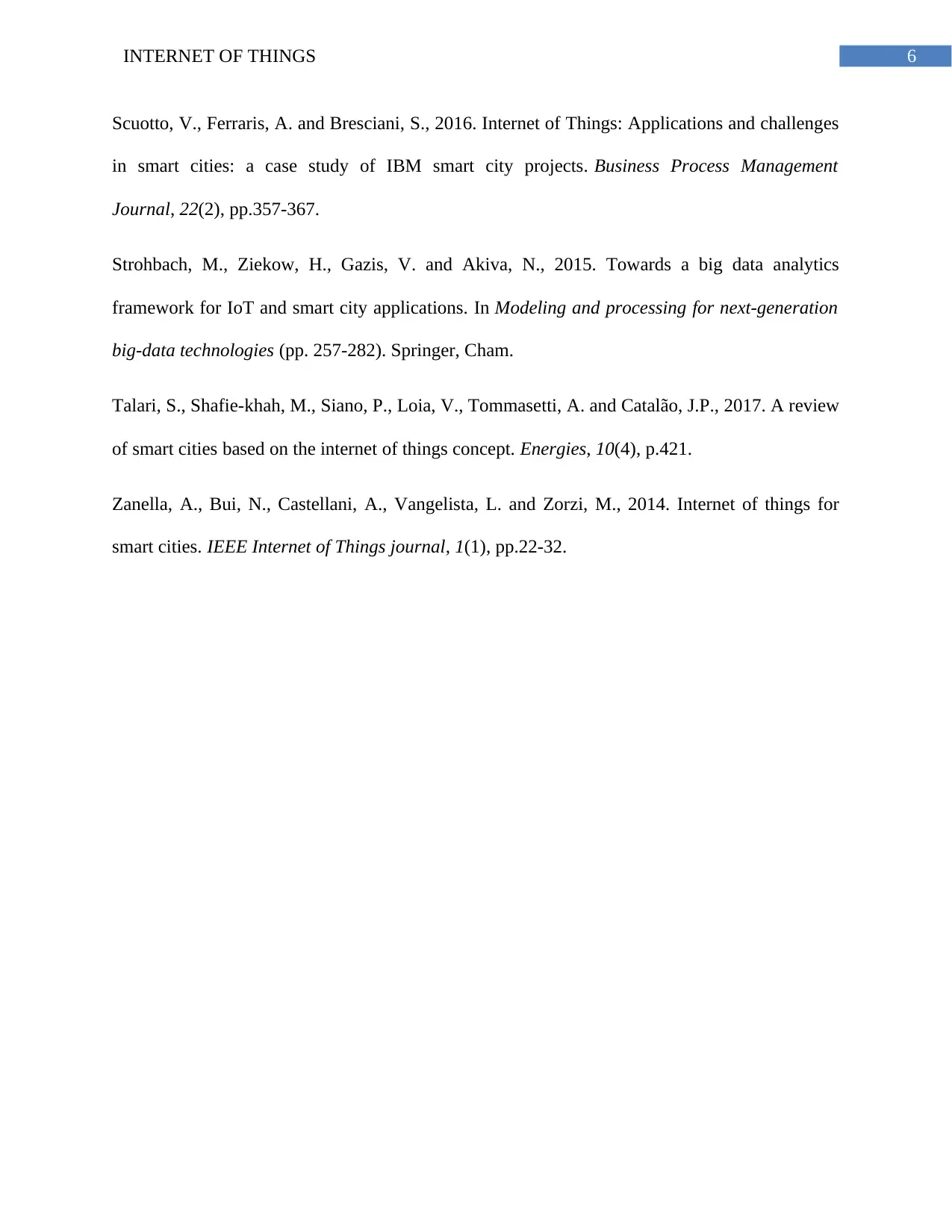
6INTERNET OF THINGS
Scuotto, V., Ferraris, A. and Bresciani, S., 2016. Internet of Things: Applications and challenges
in smart cities: a case study of IBM smart city projects. Business Process Management
Journal, 22(2), pp.357-367.
Strohbach, M., Ziekow, H., Gazis, V. and Akiva, N., 2015. Towards a big data analytics
framework for IoT and smart city applications. In Modeling and processing for next-generation
big-data technologies (pp. 257-282). Springer, Cham.
Talari, S., Shafie-khah, M., Siano, P., Loia, V., Tommasetti, A. and Catalão, J.P., 2017. A review
of smart cities based on the internet of things concept. Energies, 10(4), p.421.
Zanella, A., Bui, N., Castellani, A., Vangelista, L. and Zorzi, M., 2014. Internet of things for
smart cities. IEEE Internet of Things journal, 1(1), pp.22-32.
Scuotto, V., Ferraris, A. and Bresciani, S., 2016. Internet of Things: Applications and challenges
in smart cities: a case study of IBM smart city projects. Business Process Management
Journal, 22(2), pp.357-367.
Strohbach, M., Ziekow, H., Gazis, V. and Akiva, N., 2015. Towards a big data analytics
framework for IoT and smart city applications. In Modeling and processing for next-generation
big-data technologies (pp. 257-282). Springer, Cham.
Talari, S., Shafie-khah, M., Siano, P., Loia, V., Tommasetti, A. and Catalão, J.P., 2017. A review
of smart cities based on the internet of things concept. Energies, 10(4), p.421.
Zanella, A., Bui, N., Castellani, A., Vangelista, L. and Zorzi, M., 2014. Internet of things for
smart cities. IEEE Internet of Things journal, 1(1), pp.22-32.
1 out of 7
Related Documents
Your All-in-One AI-Powered Toolkit for Academic Success.
+13062052269
info@desklib.com
Available 24*7 on WhatsApp / Email
![[object Object]](/_next/static/media/star-bottom.7253800d.svg)
Unlock your academic potential
Copyright © 2020–2026 A2Z Services. All Rights Reserved. Developed and managed by ZUCOL.




